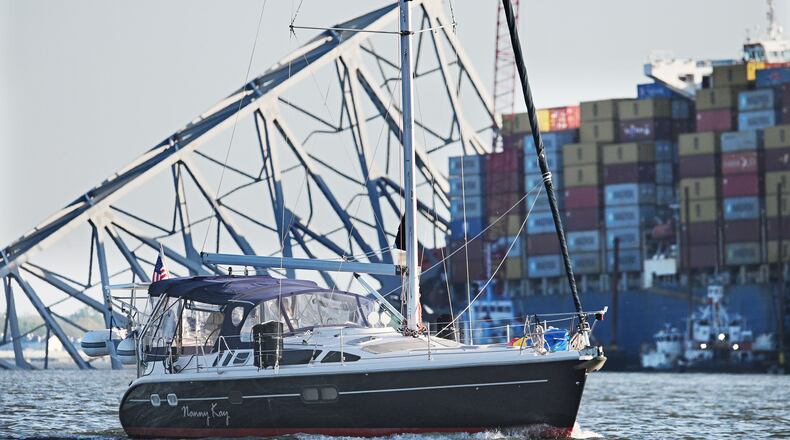U.S. Sen. Raphael Warnock on Wednesday asked both Gov. Brian Kemp and the U.S. Army Corps of Engineers “to deploy all necessary additional resources” to Georgia’s ports to help them handle the shift of cargo from Baltimore following the bridge disaster that closed that port.
In letters to the Corps and the governor, the senator, cited “a long history of bipartisan support for Georgia’s ports. He asked ”that the ports of Brunswick and Savannah be given what they need to manage the surge in cargo.
“Georgia’s ports will need cooperation and support from all levels of government as they manage the additional traffic diverted from Baltimore,” wrote, in the letters, copies of which were provided to The Atlanta Journal-Constitution. “I know we share a commitment to supporting Georgia’s ports and the economic activity they bring to the entire state of Georgia.”
Garrison Douglas, a spokesman for Kemp, said the governor had previously sent a letter to the state’s congressional delegation calling for bipartisan cooperation in supporting the ports.
“We are glad to see that Sen. Warnock is echoing our position of how important our ports are to not only Georgia’s economic success but the nation’s,” Douglas said.
The Georgia Ports Authority did not immediately respond to a request for comment Wednesday.
In the darkness of early morning on March 26, a 985-foot-long cargo ship lost power and drifted into the pylons of the Francis Scott Key Bridge. The bridge collapsed, killing a group of workers and blocking the harbor to water traffic, which effectively closed the Port of Baltimore.
The port has been the nation’s busiest for handling “roll-on, roll-off,” the vehicles and heavy machinery on wheels known as “Ro-Ro” shipments. Georgia’s Port of Brunswick has been No. 2 and, because only a few ports on the East Coast are prepared to handle Ro-Ro. Now, Brunswick is getting much of the shipments diverted from Baltimore.
Credit: contr
Credit: contr
Baltimore last year handled about 847,000 Ro-Ro items, mainly autos and light trucks. The Brunswick port carried 775,000 units. Brunswick, which was expanding rapidly before the Baltimore incident, has recently made a $262 million investment to handle more capacity, much of the work paid for with federal dollars.
Those improvements will add more space for storage and processing. The GPA has said it will triple Brunswick’s capacity for heavy equipment storage and also add a fourth Ro-Ro berth that will better handle the huge ships that can carry more than 7,000 vehicles.
The Bipartisan Infrastructure Law apportioned more than $17 billion in spending nationwide for ports and waterways, including two grants to the Port of Brunswick totaling $30 million to increase its capacity, Warnock said. On Wednesday, the U.S. Department of Transportation said Georgia will receive $15.3 million as part of anti-pollution efforts. The money would go toward a large-scale charging project, replacement of diesel-powered trucks, and expand the use of low-emission and zero-emission equipment.
The senator was instrumental in including more than $80 million for Georgia’s ports in the 2024 government funding bill, with $37 million set aside for the Port of Brunswick, he said in his letter. “Thanks to each of these substantial federal investments, the Port of Brunswick is prepared to respond to the temporary closure of the Port of Baltimore and help prevent disruptions to our nation’s automotive supply chain.”
Kemp has and the state legislature recently allocated just over $6 million for special harbor improvements at the Port of Brunswick to support the safe, efficient transit of vessels.
Earlier this week, the Georgia Ports Authority and Wallenius Wilhelmsen signed a 20-year terminal agreement that consolidates that the Norwegian company’s port and logistics operations at the Port of Brunswick.
Authority officials said in a statement that the deal will improve the port’s efficiency. The company will use its presence for “assembly, refurbishment and customizations to a variety of different equipment.”
Extensive work has been underway to re-open the Port of Baltimore aiming for a re-opening before summer, but in the interim, huge flows of shipments must be handled elsewhere.
Officials at the Georgia Ports Authority said earlier this month that they expect to receive roughly 17,000 extra units because of the bridge disaster, a 24% jump in vehicles and huge pieces of machinery on wheels coming to Georgia in April, with the lion’s share arriving in the Port of Brunswick.
“Any long-term disruption to the nation’s automotive supply chain could threaten a critical $1 trillion industry and the 9.7 million jobs it supports, including Georgia’s own burgeoning vehicle and battery manufacturing economy,” Warnock said in the letters.
About the Author
Keep Reading
The Latest
Featured




